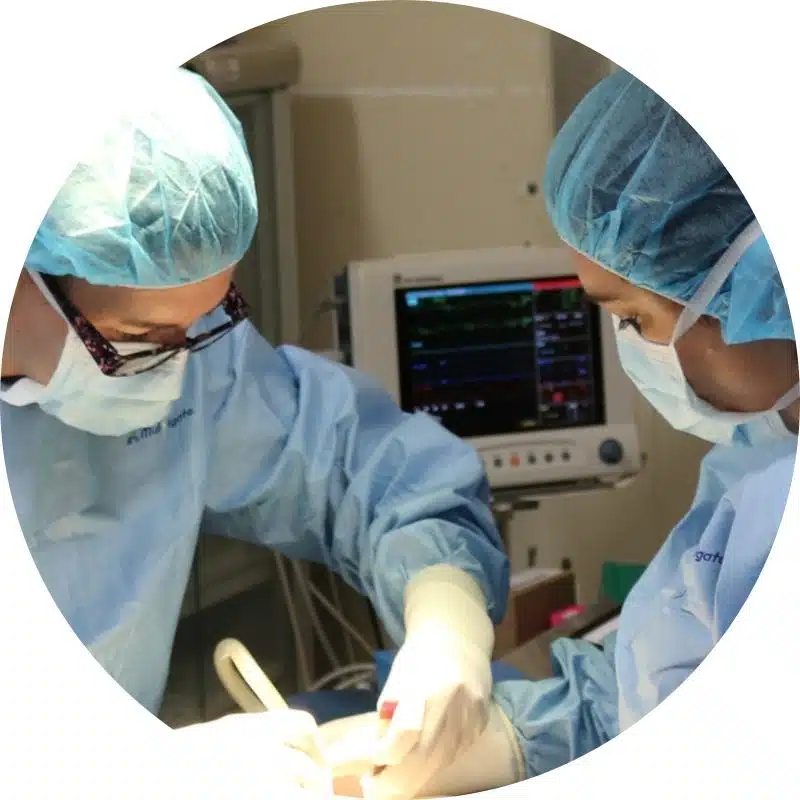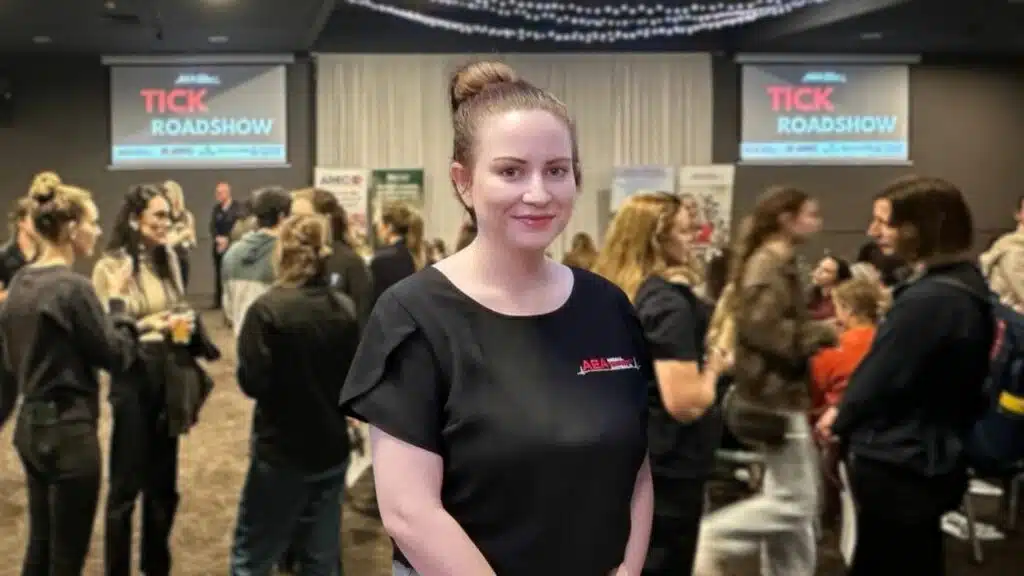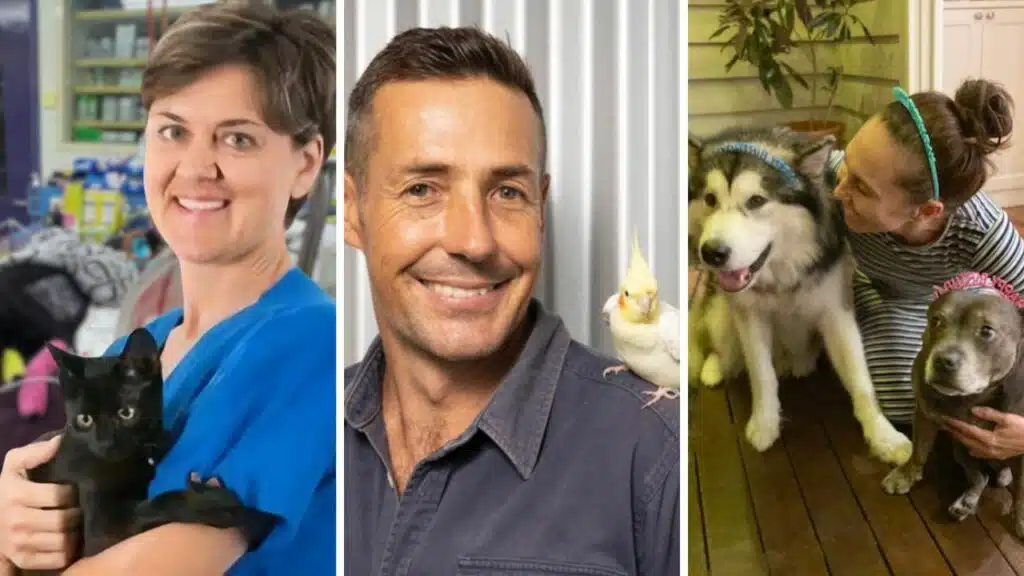How to Transition to Emergency as a New Grad
Are you currently in vet school or about to finish your final year of vet science?
Join Dr Gerardo and our AEA veterinary panel and find out if emergency is right for you.
Are you currently in vet school, about to finish your final year of vet science, or have recently just graduated in the last 12 months and have an interest in emergency but don’t know if you should pursue it? It can be challenging to know exactly where to go next after vet school. Many people think that going into GP is like dipping your toe in, and going into emergency is like jumping straight in the deep end. But is this actually the case?
Join Dr Gerardo Poli in this enlightening webinar to find out what going straight into emergency is really like and how it compares to going into general practice. Gerardo and a panel of vets who have made that step will share their experience, the traits and mindset of successful emergency veterinarians, and some valuable strategies on how to swim instead of sink.

Dive Into Your Veterinary Journey
AEA have been leading the pack in the emergency field – with hospitals all over Australia we know all about what it’s like to achieve your veterinary goals in emergency. As a vet science student or new graduate, the thought of going directly into veterinary emergency can be daunting. Even the word “emergency” gives many students a massive spike of adrenaline and excitement, but then almost as quickly elicits feelings of doubts and concerns.
We know this because we felt it too when we started.
Emergency work can be the perfect way to give your veterinary skills the valuable kick-start they need. Every shift is action-packed, interesting, and you learn so much, plus you have a massive impact and the opportunity to save lives. Vet school has given you the theory, and now it’s time to get hands on and learn by putting that into practice.
That’s why we’re here to help veterinarians to do and be their best.
In this webinar, we discuss whether emergency really is diving in the deep end, and how this can be the best way to start your veterinary career. As the experts in emergency, it’s our responsibility to provide you with everything we’ve learned over the years to ensure you not only swim, but lead the pack as a high-performing veterinarian with a focus on clinical excellence and obtain all the support and guidance you need to succeed along the way.
Watch Our Uni to Emergency Webinar
To overcome this challenge and to prepare vet students and new graduates in the best way possible, Dr Gerardo Poli, one of the leading veterinarians in the field of emergency, and our panelist of vets, share their experience in our webinar: How to Transition to Emergency As a New Grad.
Hear their advice on how to succeed as an emergency vet straight out of vet school. You’ll find out about their valuable insights including:
- Part 1: The 7 Differences Between GP and Emergency
- Part 2: Should You Choose Veterinary Emergency?
- Part 3: The Learning Curve of Veterinary Emergency
- Part 4: The Journey From Uni to Emergency
Explore these tips and more in further detail during our webinar, with all 4 parts available to watch on-demand via the links above.
View our post-webinar Q&A session as veterinary professionals ask those burning questions, and achieve your grad goals by discovering the powerful practical skills you can gain in an emergency setting. You’ll also find out how to get the support and mentoring you need, and the qualities that make for great emergency veterinarians.
Explore the 7 Differences Between GP and Emergency
In our webinar, Dr Gerardo also discusses a comparison between the nature of emergency practice and general practice. Both emergency and general medicine are on two completely different spectrums in many ways! To truly prepare you to transitioning into emergency practice, we want to ensure you understand what emergency practice is like, and what is it like to be think like an emergency veterinarian.
To find out more, watch Part 1 of our webinar above on The 7 Key Differences Between GP and Emergency and discover the characteristics that differentiate the two. This will help you create a better picture of the differences so that you get a better understanding of whether emergency is for you, and if so, how to prepare for it:
- Structure, Dynamics, and Flow of Process
- Client Interactions and Relationships
- Information Gap
- Time Available and Degree of Intervention
- Action vs. Analysis
- Targets and Stakes
- Case Load and Complexity
Webinar Part 2 – Should You Choose Veterinary Emergency?
Discover The Thrill of Veterinary Emergency
Our webinar will help you overcome the challenges of transitioning from uni into the veterinary workforce and to prepare vet students and new graduates in the best way possible. Join Dr Gerardo Poli, one of the leading veterinarians in the field of emergency, and our panelist of vets, as they share their experience and advice on how to succeed as an emergency vet straight out of vet school. We also answer the one question all grads want to know: Should You Choose Emergency?
You’ll find out about their valuable insights including:
- Important points to consider when starting emergency
- The differences between emergency medicine and general medicine
- How to determine if emergency or GP is right for you?
- The character traits of successful emergency vets
Explore these tips and more in further detail during our webinar and achieve your grad goals by discovering the powerful practical skills you can gain in an emergency setting. You’ll also find out how to get the support and mentoring you need, and the qualities that make for great emergency veterinarians.
Webinar Part 3 – The Learning Curve of Veterinary Emergency
Find Out About the Learning Curve and How to Succeed
Every profession has its own learning curve, and the same can be said for anyone beginning veterinary work for the very first time. When faced with your first clinical shift, your first consult, or your first surgery, without the right mentoring and support it can feel less like a learning curve and more like a vertical cliff face.
So what about the learning curve of veterinary emergency? How does it compare to general practice, and what can you do to approach this learning curve as effectively as possible? Dr Gerardo Poli takes these questions to the AEA veterinary team for their thoughts on the veterinary emergency learning curve and what to expect. Find out in the video above and read our article on The Learning Curve of Veterinary Emergency.
Webinar Part 4 – The Journey From Uni to Emergency
Tips and Advice For Your Veterinary Journey
To wrap up our webinar, we spoke to veterinarians here at AEA at different points in their careers: from 3 months all the way to 5 years, and asked them to share their insight into the journey from uni to emergency. We asked them to describe their journey to give you the knowledge of their own experience and the skills they gained over that time. Find out what they had to share in Part 4 of the webinar above and read our blog on The Journey From Uni to Emergency.
While discussing their journeys from uni to emergency, the team mentioned several key points that had the biggest impact on their journey, including:
- Systems and Processes – learning the overall workflow of a hospital is a challenge that takes time and experience to overcome.
- Exposure to Consults – proper mentorship and guidance in the consult room will be able to set you up for success.
- Feeling Nervous – for many veterinary professionals, even those with the most experience, the nervousness never fully disappeares.
- Skill Development – if you’re intent on choosing emergency as a career pathway, get ready for rapid skill development.
- Financial Discussions – talking about money is a skill that can be learned, especially from those who have already learned.
- Surgery – look for experience with an emergency hospital and a team that performs their own surgeries.
Lastly, the AEA vet team offers some final pieces of advice and their thoughts on how you can best approach the transition into emergency practice. Find out in our article or watch part 4 of the webinar.
Frequently Asked Questions
What guidance and mentorship will I get if I transition from uni to emergency?
We give you opportunities for one-on-one mentorship, working shoulder-to-shoulder with passionate and skilled emergency veterinarians. This can be the perfect way to gain confidence and rapidly advance your veterinary knowledge. Emergency practice at AEA offers the support from your colleagues to make sure you are transitioning ok, answer any questions you have, and to troubleshoot and help you develop solutions to challenges that arise.
What's available in-clinic to help me make the transition?
You'll have full access to our advanced in-house diagnostic lab, digital radiology, ultrasound, advanced patient monitoring, critical care capabilities. You'll also have 24/7 on-phone support and access to specialists in emergency and critical care and experienced intensive care nurses. Our teams of experienced and highly capable emergency veterinarians, nurses and client care representatives are also always available to assist you.
What continuing education is provided to make the transition easier?
The AEA Internship and Fast-Track Program provides you with plenty of continuing education that advances your veterinary skills beyond vet school. This includes: Accelerated Emergency Program designed to build vital clinical skills and knowledge, Emergency Surgery Program with step-by-step breakdowns of common emergency surgical conditions, Ultrasound Training to enhance your powerful diagnostic skills in practice, Vet Success Academy – master consultations with confidence and professionalism. And plenty more!
Still have questions?
Download the Internship Info Package
Receive support and mentorship throughout every step of your journey into the exciting world of veterinary emergency with…
- Guidance and mentoring from experienced veterinarians
- Access to everything an emergency veterinarian would need
- Continuing education that advances your veterinary skills
Sound like the support you need? Find out more in the info package.
Get Your Info Package

People and Culture
Veterinary Marketing with Jacqui Brandwood, AEA Marketing Manager
Want to explore the exciting world of veterinary marketing? Join AEA Marketing Manager, Jacqui Brandwood, to find out why it matters!

Patient Care, Practice Management
The Hospital Support Team (And Improving Patient Outcomes)
The Hospital Support Team is more than just a backbone for veterinary operations; it’s a driving force behind our mission to improve patient outcomes.

Career Talk
Veterinary Work in Australia: A Guide for South African Veterinary Professionals
Considering veterinary work in Australia? Learn from South African professionals who made the move. Insights & advice for a successful transition.
